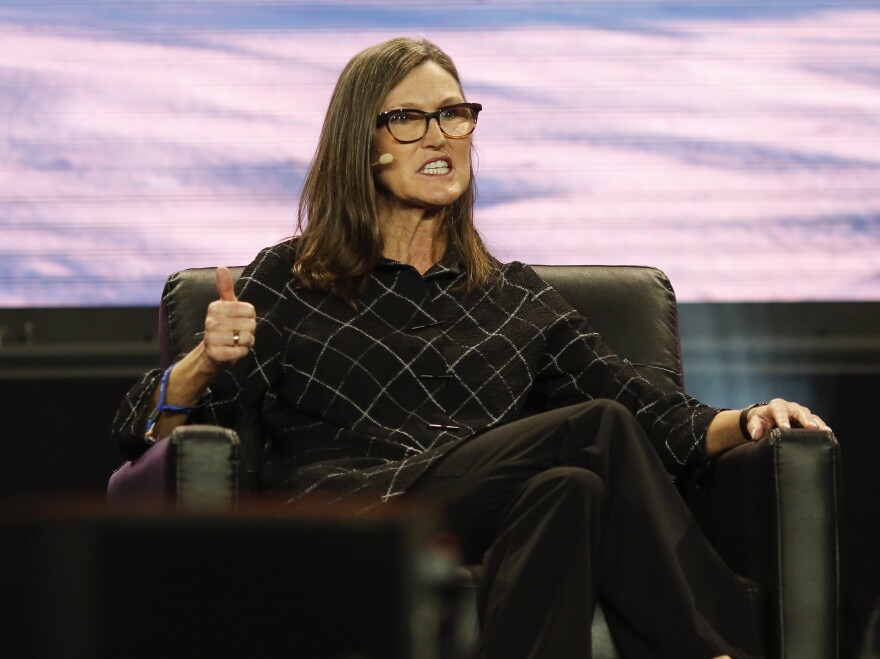In February last year, Cathie Wood was the toast of Wall Street.
The 66-year-old investor had attracted millions of devoted followers with a unique vision that she frequently laid out in YouTube videos and tweets: that huge technological advances are reshaping the world, and Wall Street is too timid to take advantage of those seismic shifts.
In 2020, that vision paid off big time. Her flagship fund, called the ARK Innovation ETF, returned an astonishing 150% – well above the S&P 500's 16% return, when lockdowns led to a surge in many of tech companies Wood had bet on, including Zoom Video Communications and Roku.
It seemed Wall Street couldn't get enough – until recently.
Those same companies that had brought her so much success have plunged, and Wood's flagship fund has fallen hard. It's down by about 55% this year, much worse than the 18% fall in the S&P.
And eight other funds Wood manages as the head of ARK Invest, including ones focused on financial technology and space exploration are among the worst performing ones in their category on Wall Street.
Her performance has been so poor it's left Wall Street wondering whether one of the most unusual and successful investors it's seen in years was talented – or just lucky.
Wood has heard the criticism and the doubters before, and she is unfazed. She argues ARK Invest's success should be judged over a five-year period because it will take time for the companies in her portfolios, many young and not profitable, to mature.
"I'm pretty battle-tested on that score," she said in a recent interview with NPR. "And as I say to anyone who will listen, just keep your eye on that prize."

Chasing the prize
It's a prize that has led her down an unusual career path.
Wood rose through the ranks on Wall Street, from a stock analyst at asset manager Jennison Associates to a portfolio manager at AllianceBernstein.
But along the way, she recognized there was a lot she didn't like about Wall Street.
Wood became convinced it isn't moving fast enough to capitalize on a world she believes is on the cusp of radical technological transformation because it is too cautious and too focused on sticking to traditional ways of investing.
"I really do believe that it borders on one of the greatest misallocations of capital in the history of mankind," Wood said.
Throughout her career, Wood has looked for stocks that "fall through the cracks."
An early example, she says, is Reuters, now part of a company called Thomson Reuters, which was then categorized as a database-publishing company even as the company waded into faster way of transmitting stocks data in the 1980s.
Wall Street analysts didn't quite know how to categorize Reuters, but Wood says she did.
"I raised my hand and said, 'I want that. That seems very interesting,'" Wood recalled. "As it turns out, it was the precursor to the Internet. I was a natural analyst for the Internet."
Setting out on her own
By 2014, Wood had enough.
She mulled her options over a six-year period, and then Wood, a devout Christian, decided to go for it. She started her own firm, ARK Invest.
"A lot of prayer went into that," Wood said. "I was 57 at the time. So, you know, it was a choice. Do I retire? Or do I start this business? So, it was a big leap of faith."
Her vision was simple: finding companies like Reuters that were regarded as too risky, or that Wall Street ignored, but had the potential to upend the status quo. Like Tesla.
Wood first invested in the electric car manufacturer when many on Wall Street were skeptical. But she and her team determined it was a company that would be disruptive. Today, Tesla is worth almost $700 billion.
"We think there are a lot more Teslas evolving out there," she said. "Meaning these companies that are enabling the convergence of technologies and various sectors, and are going to enjoy explosive growth opportunities."

Evangelizing on social media
At ARK Invest, Wood set out to do things her own way.
At the firm's headquarters in St. Petersburg, Fl., she oversees a small team of analysts, many of whom haven't even worked on Wall Street.
Wood says she prefers to hire people with subject matter expertise in artificial intelligence, for instance, and genomics.
"She is almost like a missionary on these topics," said economist Arthur Laffer, who taught Wood when she was an undergraduate student at the University of Southern California in the 1970s. "She's just full of enthusiasm and knowledge for it, and it's contagious."
Laffer, best known for his theory that cutting tax rates can increase government revenue, counts himself among her admirers. And like many of them, he has invested money in ARK Invest's flagship fund
Something else that sets Wood apart is how she has embraced social media. She has more than a million followers on Twitter, and ARK Invest's videos on YouTube have almost 15 million views.
Wood's online outreach appeals to younger investors in particular, who have helped her firm grow from managing just over $10 million to more than $40 billion, turning her ARK Innovation fund into one of the largest in that investment segment.

Just Cathie
Kevin Paffrath is one of those young investors. He is a YouTube star in his own right, and like many of Wood's followers, he calls her Cathie. Just Cathie.
"About a year into me being on YouTube, we heard Cathie's bull theses," he says. "I had just bought a Tesla myself so, it seemed like somebody very easy to align with, and I have to say, I completely agreed with."
For a while, Wood could seem to do no wrong.
The pandemic helped turbocharge Wood's investments and her thesis looked incredibly prescient.
As it turns out, however, February 2021 marked the peak of the ARK Innovation ETF's run. It has slumped about 72% since then, driven by a particularly rough performance this year.
Many of the factors that propelled her fund are now turning against her. Annual inflation has hit its highest level in decades, and the Federal Reserve is in the midst of aggressively raising interest rates to help cool down prices.
Technology – the centerpiece of Wood's portfolios – has been one of the market's worst performing sectors.
There are three dozen holdings in ARK Innovation ETF, including the cryptocurrency exchange Coinbase, the e-commerce company Shopify, and the virtual healthcare provider Teladoc.
All of them are down more than 65% year to date.
"The underperformance of the strategies is really profound," says Morningstar analyst Robby Greengold. "They have been among the worst performing funds in the entire universe of U.S.-sold open-end mutual funds, or ETFs."

Betting against Wood
And now, her critics are pouncing. They say her funds are too risky, and that Wood is a one-trick pony.
A fund has even been started to bet against her ARK Innovation ETF.
The Tuttle Capital Short Innovation ETF fund has brought in about half a billion dollars from investors since it was established six months ago, and this year, it is up about 80%.
"We knew that the types of stocks that the ARK Innovation ETF buys are stocks that don't do well in a rising rate, inflationary environment," said Matthew Tuttle, the CEO and CIO of Tuttle Capital Management, who started the fund.
Tuttle says it's nothing personal. He speaks admiringly of what Wood has built, but he wonders about the consequences of Wood's cult of personality.
"It is going to create raving fans, which is one of the reasons why they don't see a lot of outflows," Tuttle said. "But, number two, it is going to create raving critics, and you've got to have a really thick skin to be able to deal with that."

Eyes on the prize
Wood's travails have not appeared to dent her confidence.
In interviews, she continues to point to her past success, and she insists — over and over again — her performance should be judged over a five-year time horizon.
In her latest YouTube videos, Wood is characteristically upbeat as she encourages her followers to stay focused.
"Read our research for hope, optimism, and really, a thrilling look at what the future is going to hold," she says.
Wood has something else that gives her comfort. So far, the money has continued to flow in from new investors, all betting her vision for the future will come to pass. This year, $1.4 billion in net inflows have gone into the ARK Innovation ETF alone.
And followers like Paffrath are hanging on.
He's heard the criticism of Wood, and has seen how badly her funds have performed recently, but Paffrath still has his eye on that prize.
"You can't go 10 minutes on CNBC without someone mentioning her, but they are all trying to say mean things," Paffrath says. "Look, everybody has their turn, and I think she is doing right for the world."
Copyright 2022 NPR. To see more, visit https://www.npr.org.





